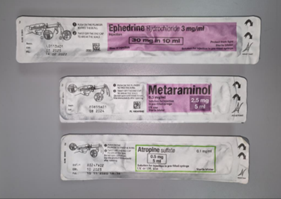Case study – The Environmental Benefits of Using Prefilled ‘Emergency’ Drugs

Organisation: Manchester University Hospitals NHS FT
What was the issue?
Prefilled drug syringes are recommended for their improved patient safety profile relating to their clear labelling, reduced dilution errors and lower infection risks. They have also been cited as a potential method of reducing the carbon footprint of anaesthesia. This is particularly true of ’emergency drugs’, the common anaesthetic practice of drawing up ‘just in case’ drugs to rapidly correct unanticipated complications of anaesthesia, usually hypotension and bradycardia. Syringes of these drugs are routinely drawn up at the beginning, and then discarded unused at the end of, each list.
What action was taken?
Audit was undertaken to identify current departmental practices for drawing up emergency drugs and the level of wastage. On three discrete weekdays, all theatres with an anaesthetic team present in a tertiary teaching hospital were visited to establish which emergency drugs had been drawn up. At the end of the second session theatres were visited again to establish which emergency drugs had been discarded or were still present unused. At the beginning of this process a life cycle inventory was performed to calculate the theoretical Global Warming Potential (GWP) measured in carbon dioxide equivalents (kgCO₂eq) for the materials used and their disposal by incineration.
Prefilled syringes were then introduced across the site, a large tertiary centre. Following this, re-audit was undertaken to assess any reduction in drawing up of emergency drugs when pre-filled syringes were available. The change in GWP accounted for by change in practice was subsequently calculated based on these figures
What was the Delivering a Net Zero NHS benefit? )
Pre-intervention 100% (52/52) of theatres audited drew up emergency drugs with an average 585 syringes of emergency drugs wasted per theatre per year, generating 6.1kg of waste. This gave a GWP for production and disposal of 34.2 kgCO₂eq for the wasted drugs. Following the approval and introduction of prefilled syringes there was a substantial change in practice with 63% of theatres no longer drawing up emergency drugs at all, reducing waste to 93 syringes per theatre per year, with a mass of 0.8kg and GWP of 4.7kgCO₂eq. This represents a GWP reduction of 86%.
What are the wider benefits?
The financial costs of introducing the prefilled syringes were considered in the process, although there was a small net cost anticipated to the trust this was considered likely to be offset by any saving in costs associated with drug errors prevented. The project demonstrates positive outcomes that should be easily translatable to other anaesthetic departments. When added to their significant patient safety benefits, the environmental benefits of prefilled syringes make a strong case for their use even more compelling.
Link for further information:
Poster providing further details.
Key contact and email: Dr M. Clayton-Smith – Max.Clayton-Smith@mft.nhs.uk
